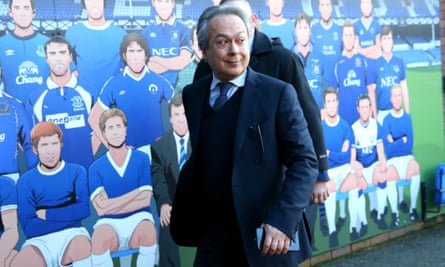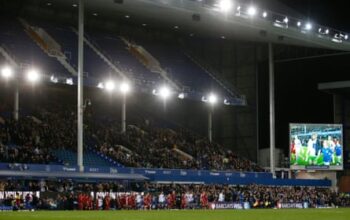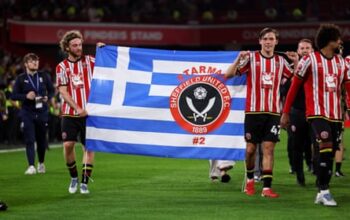There was shock and deflation inside Everton’s HQ at the Liver Buildings on Friday when it was confirmed the Friedkin Group would not be buying the club after all. Stability, direction and owners with a sound reputation in the football industry and beyond – everything Everton are crying out for – appeared within reach. Alas, no, the consequences of Farhad Moshiri’s calamitous reign must be felt for some time yet.
Everton insist it is business as usual after the collapse of the American company’s proposed takeover. The club can, in fairness, support that claim. The construction of their stunning new stadium at Bramley Moore dock is not far off completion, with the remaining costs covered by Friedkin’s initial loan of £200m. There is no pressure on the club to repay that sum in the short term. The threat of administration has lifted and Everton’s day-to-day finances will benefit soon from the next instalment of broadcasting revenues.
Manchester United have been told it will take an eye-watering sum to test Everton’s resolve that Jarrad Branthwaite is not for sale and Amadou Onana has joined Aston Villa for £50m. The director of football, Kevin Thelwell, continues to pursue several transfer targets and had been working on the basis that a takeover by Friedkin, or any other party, may not have gone through in time to transform this summer’s tightly constrained strategy anyway. Branthwaite is expected to be offered an improved contract to extend his stay.
But while Everton have not been plunged into instant turmoil by Friedkin’s withdrawal, their long-term future is again shrouded in uncertainty. The main reason for Friedkin’s decision not to proceed with a deal to purchase the 94% stake held by Moshiri’s Blue Heaven Holdings, after four weeks of due diligence into Everton’s finances, indicates there is no straightforward route into the light.
The owners of Roma, headed by the Texan billionaire Dan Friedkin, were ultimately put off buying Everton because of factors connected to the £200m loaned to the club by 777 Partners during its failed eight-month takeover attempt. The controversial Miami-based investment firm was Moshiri’s dreadful choice to buy Everton before its efforts inevitably collapsed in June. 777 Partners is in financial turmoil and facing a $600m (£464m) lawsuit in a New York district court brought by Leadenhall Capital Partners. Leadenhall accuses 777 of serious fraud and has obtained a preliminary injunction as part of which any money paid back to 777 must be available to creditors. Until that civil case is resolved, and any outcome could be subject to an appeal, the repayment or renegotiation of that £200m loan represents an obstacle that Friedkin concluded could not be overcome. It could have, for example, repaid a sum to A-Cap, the US insurer which has security on 777’s assets, only for the case to go in Leadenhall’s favour.

There was an encouraging degree of interest in Moshiri’s shareholding when the exclusivity period with 777 expired last month. The Crystal Palace co-owner John Textor, who has yet to sell his 45% stake in the Selhurst Park club, and various consortiums led by the former LA Dodgers general manager Kevin Malone, MSP Sports Capital, the businessman Vatche Manoukian, the private investment fund Vici and the Everton-supporting businessmen Andy Bell and George Downing stepped forward. Several may do so again, but they face the same legal problems with the 777 loan that turned Freidkin away and must be prepared to take a considerable risk on that debt for Everton finally to be rid of Moshiri. Friedkin insists the amount owed to 777 – or A-Cap – was not the issue.
The Friedkin Group “will remain a lender to the club and is proud to have played a key role in enabling the new stadium to be built, which will help ensure a bright future for both Everton and the city of Liverpool”, read the joint-statement that confirmed the collapse of their takeover last week. “Blue Heaven Holdings maintains a positive relationship with The Friedkin Group,” it added. Friedkin’s initial attempt to buy Roma fell through in June 2020, when the world was dealing with the impact of the pandemic, before being revived two months later.
after newsletter promotion
With £225m owed to Rights and Media Funding on an interest rate understood to be 10.25%, £200m owed to Friedkin and £200m loaned from 777, hundreds of thousands of pounds are going out of Everton each week. Moshiri is facing huge losses on the £450m in shareholder loans he has given to Everton too. The final season in Goodison’s history beckons, Bramley Moore awaits next summer, but between Everton’s past and future there is limbo. The club is back to craving a resolution once again.
Source: theguardian.com


